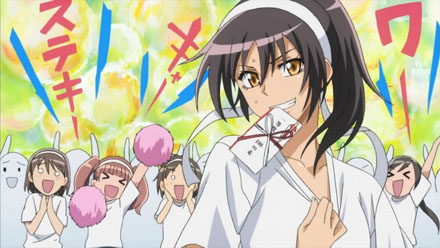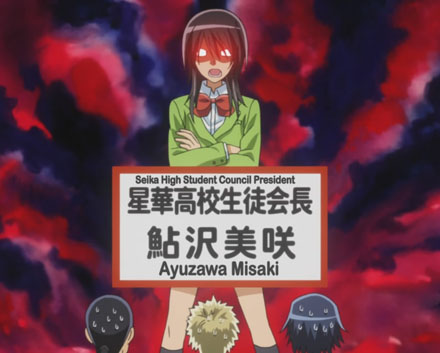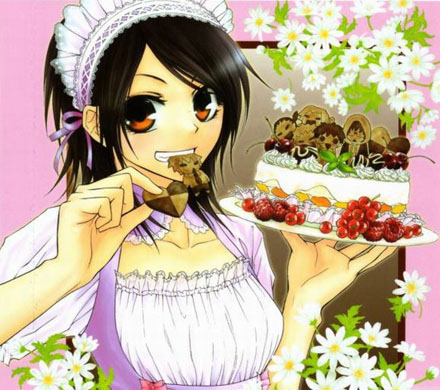 Note: this post is also on Japanator as a feature.
Note: this post is also on Japanator as a feature.
When my lolita friend Bune suggested I check out Kaichou wa Maid Sama! (President is a Maid!) I was expecting a bubbly shoujo comedy-romance. I was half right.
The leading lady, Ayuzawa Misaki, is anything but bubbly. The class president who works as a maid cafe for plot-convenient financial reasons, Misaki is poised, authoritative, and physically strong. The humor comes from the plot point that, as the female student president of a mostly male school, she can’t let anyone know about her part time job. (The romance comes from one particularly hot classmate who finds out and promises to keep it on the DL.)
 When the series started, I thought Misaki’s ability to verbally and physically overtake her male classmates would soon give in to feminine vulnerability as soon as she found a love interest — that she’s just a tsundere that needed a man to set her straight. However, I’m halfway through the series and no man can conquer this powerhouse of a character (and what’s better, several of the storylines involve Misaki teaching her female friends to stick up for themselves, too). Misaki is smarter, stronger, and more articulate than every other character in the show. At the same time, she’s drawn realistically, with brown hair and eyes and a modest figure. Maid Sama! is a shoujo anime so she’s made to be a role model for girls — she’s designed for a female gaze.
When the series started, I thought Misaki’s ability to verbally and physically overtake her male classmates would soon give in to feminine vulnerability as soon as she found a love interest — that she’s just a tsundere that needed a man to set her straight. However, I’m halfway through the series and no man can conquer this powerhouse of a character (and what’s better, several of the storylines involve Misaki teaching her female friends to stick up for themselves, too). Misaki is smarter, stronger, and more articulate than every other character in the show. At the same time, she’s drawn realistically, with brown hair and eyes and a modest figure. Maid Sama! is a shoujo anime so she’s made to be a role model for girls — she’s designed for a female gaze.
I don’t think this would happen on American TV. Hollywood’s idea of a strong female character is one who is forceful during romantic encounters, basically, in regard to a male character or male gaze. We very rarely see a female gaze in American television at all. This is why it was so hard for me to accept that Misaki is strong and remains that way, whether she’s in love or not.
Why is this happening in Japan, a country we consider far more sexist than America? I found one hypothesis in Roland Kelts’ Japanamerica. Kelts observed that animes often have female or child heroes and found that this has a lot to do with Japanese identity. He interviewed anime journalist Hideki Ono, who presented his take:
“Also very Japanese, [Ono] believes, is the emphasis on female and child characters… He theorizes that Asians in general, and Japanese especially, like to have more diminutive characters performing heroic feats — David beating Goliath — primarily because they are physically smaller than other ethnicities.”
Maid Sama! fits well with this storyline, as average looking Misaki beats all the boys at the Sports Festival, files comically large stacks of paperwork in mere minutes, and gets the highest grades in the whole school, all while beating up stalkers and delinquents.
 Of course, Maid Sama! is not without its subtle sexual storyline — Misaki IS a maid-cafe maid and plot points frequently refer to the various moe themes at the cafe: Glasses Girl Day, Pigtails Day, Visual Kei Day etc. But the fan service is never gratuitous, and some of the comedy comes from Misaki’s irration at having to act cutesy. If anything, the costumes and personas the maids assume on moe days show that weakness as femininity is just an act. Not to mention the parallel between the way Misaki’s male classmates are at her mercy at school, so are the male visitors to the maid cafe.
Of course, Maid Sama! is not without its subtle sexual storyline — Misaki IS a maid-cafe maid and plot points frequently refer to the various moe themes at the cafe: Glasses Girl Day, Pigtails Day, Visual Kei Day etc. But the fan service is never gratuitous, and some of the comedy comes from Misaki’s irration at having to act cutesy. If anything, the costumes and personas the maids assume on moe days show that weakness as femininity is just an act. Not to mention the parallel between the way Misaki’s male classmates are at her mercy at school, so are the male visitors to the maid cafe.
Has anyone else watched Kaichou wa Maid Sama!? I definitely recommend it, not just for the feminist critique I’ve made of it, but because it’s a refreshing slice-of-life anime far removed from the excessive fan service I’ve been rotting my brain with this anime season.
9 Comments.
Maid-sama is an enteraining and very refreshing anime/manga.
Without waxing too philosophical on it’s theme and structure, I will say that most anyone will find the show fun to watch.
~td99
Interesting. Hollywood might be behind the times, but TV isn’t. Take Kate from Lost, or Natalie from Monk. They’re strong characters, without/even with a love interest.
Jenn, I haven’t seen either show, so I can’t make an argument there. Just going to have to take your word for it!
I recommend you check out the discussion on this article in the Japanator cross post. We’re bringing up some interesting ideas.
When I first heard about this series, I was always curious. I mean, people on the net have been telling me it’s an interesting series, but due to various “me-two” shojo series, my hopes of this being a ‘great’ series for females was slowly diminishing (mainly due to how a lot of series e.g. Ouran High School Host Club started off with such promise and then quickly losing the plot with the latter chapters).Your post however, solidifies that I should at least give it a go.
Interestingly enough, my love for Ouran High School Host Club is one of the reasons I like Kaichou wa Maid Sama! Wait until you meet the snobby rich school students in THIS one!
I really want to like the show, but Usui’s courtship through semi-blackmail and sexual harassment make me deeply uncomfortable. I just watched the cram school episode, and the way the show constantly cuts to closeups of his grabby hands whenever he pulls Misaki aside was pretty creepy. Unwarranted inappropriate touching is romantic?
Kim, you might still like the manga. They made Usui extra pervy for the anime. But yes, you’ve noted on a disturbing practice. They employ this in a lot of shounen ai shows too (Yuki shoving Shuichi against a wall etc.) so I wonder if this is something Japanese women fantasize about?
Yo!
I’m glad you like Kaichou. It’s one of those series that I dropped for time reasons and intend to pick back up. While Misa-chan is certainly a breath of fresh air due to her hypercompetence, I find her to be a less complex tsundere lead than, say, Taiga, as her hard candy shell is mostly a construct that comes from her own prejudice and therefore she doesn’t wrestle with it overmuch (makes for sluggish development from where I sit).
IN CONTRAST, Usui rocketed to the top of my favorite bishies list (dethroning the comparatively milquetoastian Tamaki Suoh). I think the combination of creepiness, cool, and consideration is a function of the demands of his prey. True, he’s more than a little pervy, but he’s so in control of himself that I’m inclined to believe that he’s doing it because he thinks that those are the measures required to win Misaki over.
Besides, the jump from the school building was so epic I am still without words.
Patches, WHY DID HE LIVE? Answer: ’cause he’s badass like that.